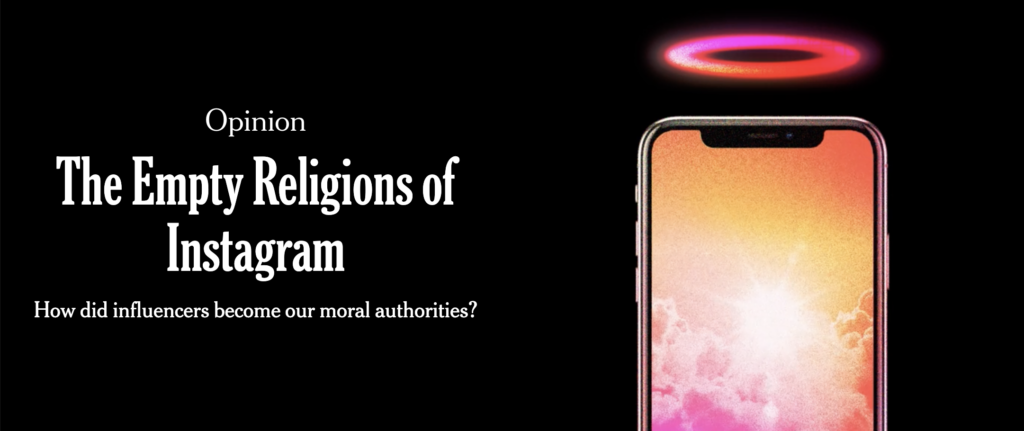Earlier this month, The New York Times published a fascinating opinion piece titled, “The Empty Religions of Instagram.” In it author Leigh Stein argued that online influencers have essentially become the millennial generation’s televangelists.
But, unlike their TV predecessors, these new celebrity moral authorities are not drawing an audience under the guise of Christianity. Instead they are reaching the so-called religious “nones” with a message of secular hope. These influencers mix just the right amount of spirituality and moral authority with practical advice to make themselves attractive to the irreligious.
Many millennials who have turned their backs on religious tradition because it isn’t diverse, or inclusive enough, have found alternative scripture online. Our new belief system is a blend of left-wing political orthodoxy, intersectional feminism, self-optimization, therapy, wellness, astrology and Dolly Parton.
Leigh Stein, The Empty Religions of Instagram
Stein describes the genre of these online personalities as “personal growth influencers.” But they act more like faith leaders. And, boy, do they have disciples! Some of them boast millions of followers across their platforms. But Stein has observed a problem: These new faith leaders don’t actually have anything of substance to offer.
As Stein notes, “there is a chasm between the vast scope of our needs and what influencers can possibly provide.” This author is not a Christian, by the way. But it seems to me that souls in search of meaning always recognize fakes when they find them. And that’s what makes Stein’s comparison so apt. These online influencers really are like many of the televangelists of the 1980s. They’re energetic, they believe in you, they have platitudes a plenty, and some of them even wear veneers on their teeth. But get an inch below the surface of their message and you discover there is nothing there at all. No meaning, no transcendence, and no foundation to any of it.
It’s a great article, and I commend it to you. But it got me thinking about how Christians engage online. Part of me, of course, is discouraged by the popularity of social media pseudo-faith leaders leading people astray. But I believe there is an opportunity here that we may be missing. It is remarkable how few solid believers there are filling the gaping void for biblically-grounded influencers.
Yes, influencers.

Go into all the online world
We have before us a generation in search of meaning and they’re looking on TikTok and Instagram. So where is the church on those platforms? I know there are some. But more believers should be seizing the opportunity. I abhor the term influencer, it sounds ridiculous, but I find myself wishing we had more believers who chose to take up “online ministry” for the sake of the lost.
Yes, I know plenty of Christians have blogs and podcasts, and there are sermons and live streams from churches all over the internet. Praise God for that! But people in search of meaning are not looking up your church’s live stream or sermons online, they aren’t searching out Christian blogs. Eventually, that’s where we want to get them, of course. But we have to first go to where they are. I strongly believe we ought to be approaching the internet more like a mission-field (I plan to write more elsewhere on the particulars of how we might do this under the auspices of our local churches).
But there exists now an opportunity unlike any we have seen before. And, no, I’m not even talking about Covid right now. What I mean is that we live in an era where a regular individual is able to have an outsized influence over the thinking of vast swaths of people without the requirement of going through traditional institutional gatekeepers.
It is the age of the influencer.
And there is nothing but the will to do it stopping Christians from pursuing this ministry.
The light of the world
So, I wish that individual believers would think creatively about how they might use their own online platforms to influence the world for Christ. We are, after all, more than mere influencers. Jesus said “You are the light of the world.” And unfortunately, there is a corner of this world brimming with darkness, and it is one into which few believers choose to shine their light. The fields of the internet are still white unto harvest. There are new opportunities every day, if we would just open our eyes to them.
We have the meaning, the answers that Ms. Stein and her generation are seeking. We have truth.
Will we leave it to the self-proclaimed self-help gurus of the internet, or will we shine into the darkness the light of the knowledge of the gospel of our Lord Jesus Christ? Will we present a vision of a life of purpose just by showing what the life of a Christian actually looks like? I wonder if we take for granted how wonderful it is to live a life that is not built upon the flimsy home-made meaning of post-modernity, but on the firm foundation of the objective revelation of God. That’s exactly what the world is longing for.
So, let’s share it.


I look forward to reading your thoughts on how to go about this on a local church level. Personally, I’ve all but given up hope of anything good coming out of social media anymore, and I’d love to be proven wrong.